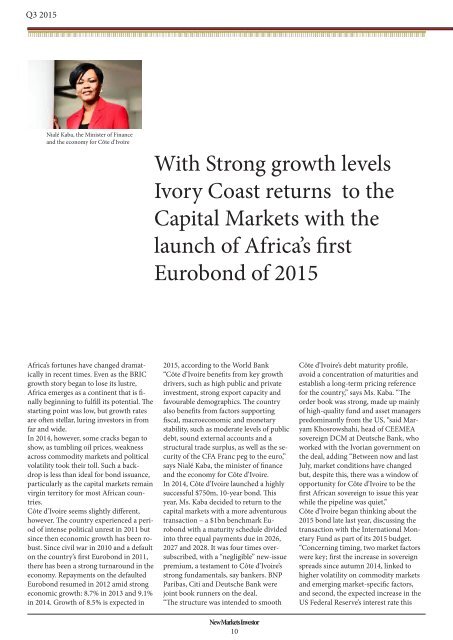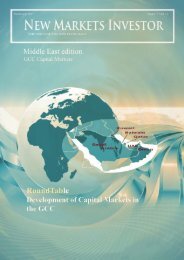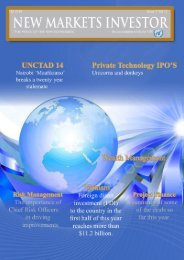New Markets Investor
Published by The Media Corporation
Published by The Media Corporation
Create successful ePaper yourself
Turn your PDF publications into a flip-book with our unique Google optimized e-Paper software.
Q3 2015Nialé Kaba, the Minister of Financeand the economy for Côte d’IvoireWith Strong growth levelsIvory Coast returns to theCapital <strong>Markets</strong> with thelaunch of Africa’s firstEurobond of 2015Africa’s fortunes have changed dramaticallyin recent times. Even as the BRICgrowth story began to lose its lustre,Africa emerges as a continent that is finallybeginning to fulfill its potential. Thestarting point was low, but growth ratesare often stellar, luring investors in fromfar and wide.In 2014, however, some cracks began toshow, as tumbling oil prices, weaknessacross commodity markets and politicalvolatility took their toll. Such a backdropis less than ideal for bond issuance,particularly as the capital markets remainvirgin territory for most African countries.Côte d’Ivoire seems slightly different,however. The country experienced a periodof intense political unrest in 2011 butsince then economic growth has been robust.Since civil war in 2010 and a defaulton the country’s first Eurobond in 2011,there has been a strong turnaround in theeconomy. Repayments on the defaultedEurobond resumed in 2012 amid strongeconomic growth: 8.7% in 2013 and 9.1%in 2014. Growth of 8.5% is expected in2015, according to the World Bank“Côte d’Ivoire benefits from key growthdrivers, such as high public and privateinvestment, strong export capacity andfavourable demographics. The countryalso benefits from factors supportingfiscal, macroeconomic and monetarystability, such as moderate levels of publicdebt, sound external accounts and astructural trade surplus, as well as the securityof the CFA Franc peg to the euro,”says Nialé Kaba, the minister of financeand the economy for Côte d’Ivoire.In 2014, Côte d’Ivoire launched a highlysuccessful $750m, 10-year bond. Thisyear, Ms. Kaba decided to return to thecapital markets with a more adventuroustransaction – a $1bn benchmark Eurobondwith a maturity schedule dividedinto three equal payments due in 2026,2027 and 2028. It was four times oversubscribed,with a “negligible” new-issuepremium, a testament to Côte d’Ivoire’sstrong fundamentals, say bankers. BNPParibas, Citi and Deutsche Bank werejoint book runners on the deal.“The structure was intended to smooth<strong>New</strong> <strong>Markets</strong> <strong>Investor</strong>10Côte d’Ivoire’s debt maturity profile,avoid a concentration of maturities andestablish a long-term pricing referencefor the country,” says Ms. Kaba. “Theorder book was strong, made up mainlyof high-quality fund and asset managerspredominantly from the US, “said MaryamKhosrowshahi, head of CEEMEAsovereign DCM at Deutsche Bank, whoworked with the Ivorian government onthe deal, adding “Between now and lastJuly, market conditions have changedbut, despite this, there was a window ofopportunity for Côte d’Ivoire to be thefirst African sovereign to issue this yearwhile the pipeline was quiet,”Côte d’Ivoire began thinking about the2015 bond late last year, discussing thetransaction with the International MonetaryFund as part of its 2015 budget.“Concerning timing, two market factorswere key; first the increase in sovereignspreads since autumn 2014, linked tohigher volatility on commodity marketsand emerging market-specific factors,and second, the expected increase in theUS Federal Reserve’s interest rate this









